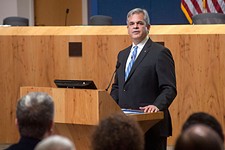Going Big
How to spend $720 million on mobility
By Michael King, Fri., July 1, 2016
After several hours of testimony and debate, early Friday morning Mayor Steve Adler persuaded a majority of his Council colleagues to approve his $720 million transportation bond proposal for the November ballot – an unprecedented size, by several degrees, for an Austin bond package. The proposal still requires Council approval, sometime in August, of precise ballot language – and a public campaign that has already begun informally – but the 8-3 vote was at least an endorsement of the mayor's ambition to "go big" on transportation, insisting that the mobility crisis continues to worsen in Austin because "we have chosen not to fix it."
The mayor also argued that since transportation costs represent a major portion of family budgets, improving transportation will also address Austin's affordability – especially if it allows greater residential density, multimodal mobility, and greater housing supply.
The bond package, if finally adopted, will contain all the major elements of Adler's original proposal – "regional mobility" projects for suburban highways, "local" projects for neighborhoods needing sidewalks, bike trails, and other "multimodal" elements, but with its primary focus on seven major "corridors" (Airport, North and South Lamar, Burnet Road, Riverside, Guadalupe, and FM 969) that will receive makeovers in accordance with plans that have been sitting on the shelf for some years but not initiated for lack of funding. Approved about 1:30am Friday, after nearly four hours of public testimony and Council discussion – Adler's resolution did undergo a couple of late-hour amendments suggested by other council members.
The most persistent critic of the Adler proposal, Council Member Ann Kitchen, previously presented a $300 million alternative endorsed by Council's Mobility Committee (which she chairs). By Thursday, she had moved to a $500 million version – essentially a proportionally reduced version of the mayor's plan. When it became clear that a majority of Council was leaning toward the mayor's proposal, Kitchen moved that both the $500 million and the $720 million versions be placed on the ballot – but that motion failed as well.
Nevertheless, she and CM Delia Garza continued to argue that the plan's predominant emphasis on the "corridors" left South Austin and especially Southeast Austin without much assistance and (with the exception of FM 969) also neglected the Eastside District 1 of CM Ora Houston. "The corridor plans are focused primarily on North and Central Austin," said Kitchen later. "It's not that that work doesn't need to be done – but we also need to correct the historical imbalance that disadvantages other areas of the city."
In response, Adler did amend his resolution to direct some planning funds to South Austin areas, although, during the meeting and afterward, Kitchen said she still wasn't entirely clear on what Adler's amendments would accomplish. She and Garza both remain concerned that such a massive bond could derail any subsequent bond proposals in 2018 and beyond for other needs – such as affordable housing, parks, or libraries. "The community has been told it's going to solve all our problems," said Garza. "I'm waiting for the 'corridors cure cancer' hashtag because apparently it's going to solve all of our problems – and it's not."
All three dissenters were dissatisfied with the rushed planning process. Adler released the proposal only a month ago, and the work sessions devoted to it were chockablock with other city matters. The uneasiness was apparent on the dais – after a 12-hour-day's work, the transportation discussion didn't begin until 10pm. Kitchen later complained, "We should not be having discussions about major issues at one o'clock in the morning."
Nevertheless, for various reasons, a Council majority declared its support of the mayor's initiative. CM Greg Casar was the most enthusiastic, arguing that Austin is lagging behind other comparable cities in funding transportation as well as other infrastructure projects and that the proposal represents a "bold step" in addressing the city's transportation challenges. He and CM Leslie Pool had earlier proposed an alternative allocation of the $720 million – excluding the regional highways and putting more funding into local and multimodal projects – but that didn't gain sufficient support, particularly from members representing the suburban western districts (Don Zimmerman, Ellen Troxclair, and Sheri Gallo), beneficiaries of the "regional" funding for state highway projects.
Gallo proposed the only other successful amendment, arguing that half the money allocated for neighborhood sidewalks ($27.5M of $55M total) should be divided by 10 and prioritized by each district council member. Casar and Mayor Pro Tem Kathie Tovo responded that the greatest needs for such safe routes to schools were not spread across the city – indeed, might well be concentrated on the Eastside – but the itch to spend their own local kitties was too strong for six of the members, and Gallo's amendment was supported by Houston, Garza, Kitchen, Troxclair, and Zimmerman.
So, despite the misgivings of some members, staff will finalize the proposal as amended and return to Council in a few weeks, with the adjusted package and proposed ballot language. (Zimmerman – who has sued the city over the ballot language for the May 7 transportation network company regulations – said his support for the bond will depend on his judgment of the ballot language.) Adler said he believes most if not all council members will support the bond campaign, and a few days later, Kitchen told the Chronicle that "at the end of the day" she hopes to be able to do so. The mayor reminded Council that there is already a public coalition (Get Austin Moving) comprised of a couple dozen transportation advocacy and real estate groups ready to underwrite and sustain a campaign. If the dais can unite to support it, perhaps the voters will come to do so as well.
Bond Transportation Projects: The Big Breakdown
Regional Mobility Projects (aka suburban highways): $93.5 million
Corridor Mobility Projects: $471.5 million
Key corridors (Lamar, Burnet, Riverside, Airport, FM 969, Guadalupe): $448M
Other corridors (Brodie, Spicewood Springs, Rundberg, S. Congress, etc.): $3.5M
Related improvements (signals, etc.): $20M
Local Mobility Projects: $155 million
(Local traffic management; RR crossings; sidewalk, bicycle, and urban trail projects; street & roadway improvements; infrastructure repair)
All Projects Total: $720 million
Source: City of Austin, Departments of Transportation and Public Works
Got something to say on the subject? Send a letter to the editor.











